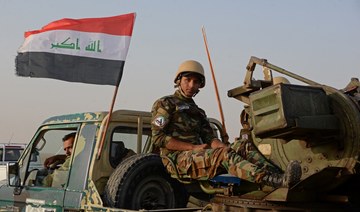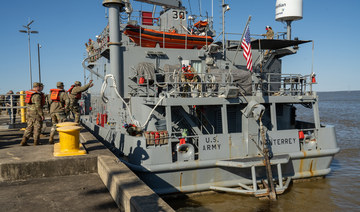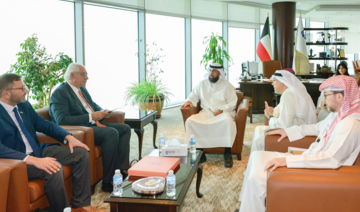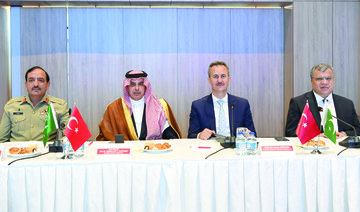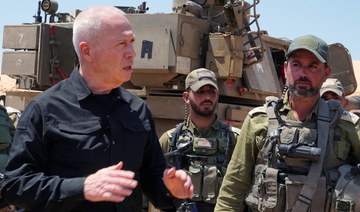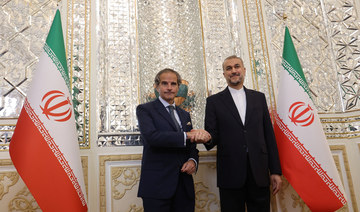AMMAN: A pregnant 15-year-old who had been raped by a brother-in-law decided to marry her attacker, hoping this would shield her from other male relatives who might kill her in the name of “family honor.”
A young woman was taken into protective custody after being stabbed 17 times by a brother who accused her of bringing “shame” to the family for running away from an abusive husband.
Jail, forced marriage or the risk of getting killed by family members — these are some of the harsh choices still faced by victims of abuse or sexual violence in Jordan.
In a key step toward reform, the kingdom is now poised to abolish a provision that exempts a rapist from punishment if he marries his victim. Jordan’s parliament is expected to do so in a special session sometime after the end of the Muslim fasting month of Ramadan next week.
Women’s rights advocates say repealing Article 308 would be a victory, but that more work lies ahead in a society with deeply rooted customs of patriarchy and a legal system that often goes easy on the male perpetrators.
“It’s about the patriarchal mentality in a society that never punishes the man or shames him for anything,” said Asma Khader, a lawyer and activist.
The “marry the rapist” provision has been repealed in Egypt and Morocco, but remains on the books in Tunisia, Lebanon, Syria, Libya, Kuwait, Iraq, Bahrain, Algeria and the Palestinian territories, according to the international group Human Rights Watch.
Judge Jehad Al-Duradi, who handles sexual violence cases at Jordan’s main criminal court, said women who agree to marry their attackers often act out of desperation.
The judge cited the case of the 15-year-old who was raped by her sister’s husband. At the pregnant teen’s request, the judge approved a marriage between the rapist and his victim.
The rapist escaped punishment and expelled his new wife from his home on the day of the wedding, leaving her to fend for herself and her child, the judge said.
Several other Jordanian laws allow lenient treatment of those who kill or assault women.
One provision lightens punishment if a man kills his wife or another female relative for allegedly having sex outside marriage. Another article says a convicted killer could receive as little as a year in prison if he acts in a “state of great fury resulting from an unlawful and dangerous act” by the victim.
If the victim’s family drops a complaint, even that one-year minimum can be cut in half. Some perpetrators in Jordan have been jailed for as little as six months for killing a daughter or sister.
Al-Duradi said Jordanian courts have imposed harsher punishment for such crimes in recent years; no convicted killer has received a sentence of less than 10 years in prison since 2010.
“The text of the law hasn’t changed, but the interpretation has,” the judge said.
Jordan’s main criminal court heard 182 rape cases in 2015 and 168 in 2016. It also dealt with 39 slayings of women in 2015, including nine labeled “honor crimes.” In 2016, there were 36 killings, including eight honor cases.
The actual numbers are believed to be higher, with many assaults going unreported, said Samar Muhareb, director of a legal aid group. Communities prefer to handle such crimes in tribal arbitration to avoid public shame.
“Whenever we see informal justice, it’s at the expense of women,” Muhareb said.
Meanwhile, Jordanian authorities often detain at-risk women.
A decision on protective custody can be made by a provincial governor, without court approval. Detention typically continues until the woman’s family promises not to harm her, or until she finds a man to marry her.
Fidaa, 25, has repeatedly ended up in prison, following a chain of events that began with her divorcing an abusive husband when she was just 15 years old.
Angered by the divorce, one of her brothers stabbed and seriously wounded her.
The brother was sentenced to five years in prison, but the then-teen also ended up behind bars. Desperate to get out of protective custody, she married a 27-year-old man, only to be forced into prostitution.
Her new husband threatened to alert her brother to her whereabouts if she refused to work as a prostitute, Fidaa said in an interview at the Juweida women’s prison on the outskirts of the Jordanian capital, Amman.
Fidaa, a petite woman with dark hair and a quiet demeanor, complied for three years. She eventually managed to leave her husband with help from the police’s family protection unit.
Ten years after her first detention, Fidaa is back in prison.
She was arrested in January, during a police raid of a brothel where she said she had found refuge after befriending some of the women there. Fidaa has been cleared of prostitution charges, but is again unable to leave detention without a sponsor.
“If my brothers know about what happened, they will slaughter me,” said Fidaa, who only gave her first name for fear of repercussions.
Sadeq Al-Omari, a senior official in the prison system, said protective custody is often the only solution, adding that “the right to life is more important than the right to freedom.”
Plans to set up shelters with police protection have not materialized so far, he said.
In the meantime, authorities imprison the female victim rather than potential perpetrators because there are too many male relatives who might hurt her, he said. “Should I put 20 people in prison for one person’s protection?” Al-Omari said.
Legislator Wafa Bani Mustafa said change begins with legal reform.
“If we can change the law so that it’s no longer a solution to get rid of the girl this way, we can encourage families to treat their daughters as victims, not as a source of shame,” he said. “If we cancel the legal umbrella, society will follow.”
Jordan to cancel 'marry the victim' clause shielding rapists
Jordan to cancel 'marry the victim' clause shielding rapists
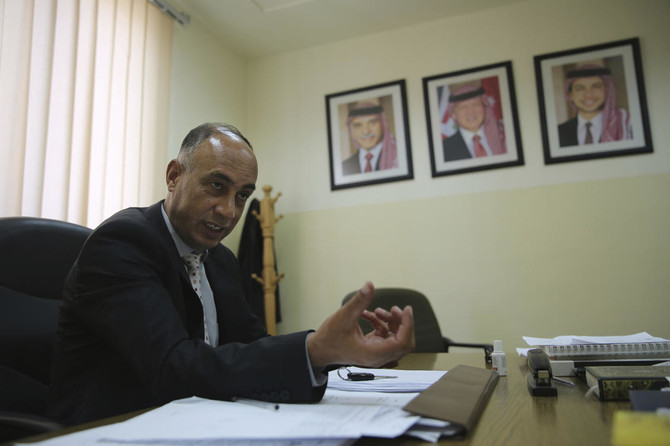
Powerful Iraqi pro-Iran group says US troops must leave
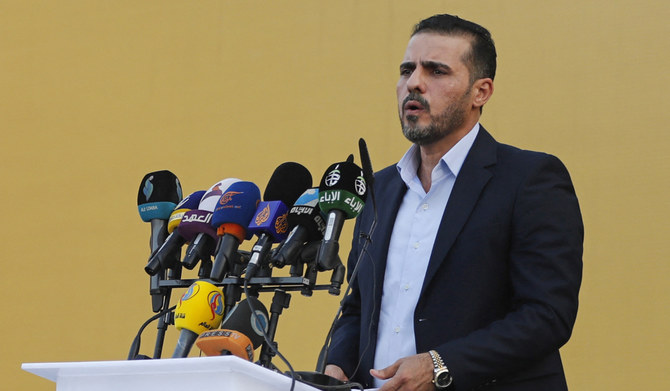
- “We also haven’t seen the necessary seriousness from the Iraqi government to remove them,” the spokesman, Abu Ali Al-Askari, added in a statement
BAGHDAD: Iraq’s powerful Kataeb Hezbollah on Tuesday renewed its call for US troops to withdraw from Iraq, months after the Iran-backed armed group suspended attacks against American forces.
Washington and Baghdad have been engaged in talks over the presence of US troops in Iraq, who are stationed there as part of an international anti-jihadist coalition.
A spokesman for Kataeb Hezbollah said in a statement that the group “did not perceive the American enemy’s seriousness in withdrawing the troops and dismantling its spy bases in Iraq.”
“We also haven’t seen the necessary seriousness from the Iraqi government to remove them,” the spokesman, Abu Ali Al-Askari, added in a statement.
The United States considers Kataeb Hezbollah a “terrorist” group and has repeatedly targeted its operations in recent strikes.
During more than three months, as regional tensions soared over the devastating Israel-Hamas war in Gaza, US troops were targeted more than 165 times in the Middle East, mainly in Iraq and neighboring Syria.
The Islamic Resistance of Iraq, a loose alliance of Iran-backed groups including Kataeb Hezbollah, had claimed the majority of the attacks.
But a deadly drone attack in late January triggered retaliation, with US forces launching dozens of strikes against Tehran-backed groups, including Kataeb Hezbollah.
Three US personnel were killed in the January 28 drone strike in Jordan, near the Syrian border.
Two days later, Kataeb Hezbollah said it was suspending its attacks on US forces.
In February the United States and Iraq resumed talks on the future of the US-led coalition’s presence in Iraq, following a request by Iraqi Prime Minister Mohamed Shia Al-Sudani who has been calling for an end to the coalition’s mission.
The United States has some 2,500 troops in Iraq and 900 in Syria as part of the international coalition against the Islamic State (IS) group.
The coalition was deployed to Iraq at the government’s request in 2014 to help combat IS, which had taken over vast swathes of Iraq and neighboring Syria.
US completes construction of Gaza aid pier

WASHINGTON: The US military has completed construction of its Gaza aid pier, but weather conditions mean it is currently unsafe to move the two-part facility into place, the Pentagon said Tuesday.
The pier — which the US military started building last month and which will cost at least $320 million — is aimed at boosting deliveries of desperately needed humanitarian assistance to Gaza, which has been ravaged by seven months of Israeli operations against Hamas.
“As of today, the construction of the two portions of the JLOTS — the floating pier and the Trident pier — are complete and awaiting final movement offshore,” Deputy Pentagon Press Secretary Sabrina Singh told journalists, using an acronym for Joint Logistics Over-the-Shore, the official name for the pier capability.
“Today there are still forecasted high winds and high sea swells, which are causing unsafe conditions for the JLOTS components to be moved. So the pier sections and military vessels involved in its construction are still positioned at the port of Ashdod,” in Israel, Singh said.
US Central Command (CENTCOM) “stands by to move the pier into position in the near future,” she added.
The vessels and the under-construction pier were moved to the port due to bad weather last week. Once the weather clears, the pier will be anchored to the Gaza shore by Israeli soldiers, keeping US troops off the ground.
Aid will then be transported via commercial vessels to a floating platform off the Gaza coast, where it will be transferred to smaller vessels, brought to the pier, and taken to land by truck for distribution.
Plans for the pier were first announced by US President Joe Biden in early March as Israel held up deliveries of assistance by ground, and US Army troops and vessels soon set out on a lengthy trip to the Mediterranean to build the pier.
Some two months later, the humanitarian situation in Gaza remains dire. The United Nations said Tuesday that Israel had denied it access to the Rafah crossing — the key entry point for aid into the besieged territory.
The White House said the closing of Rafah and the other main crossing, Karem Shalom, was “unacceptable” and needed to be reversed.
In addition to seeking to establish a maritime corridor for aid shipments, the United States has also been delivering assistance via the air.
CENTCOM said American C-130 cargo planes dropped more than 25,000 Meal Ready To Eat military rations into Gaza on Tuesday in a joint operation that also delivered the equivalent of more than 13,000 meals of Jordanian food supplies.
“To date the US has dropped 1,200 tons of humanitarian assistance,” CENTCOM said in a statement.
Gaza’s bloodiest-ever war broke out following Hamas’s unprecedented October 7 attack on Israel, which resulted in the deaths of more than 1,170 people, mostly civilians, according to an AFP tally of Israeli official figures.
Israel’s retaliatory offensive has killed at least 34,789 people in Gaza, mostly women and children, according to the Hamas-run territory’s health ministry.
Kuwait, Turkiye sign agreements during emir’s state visit
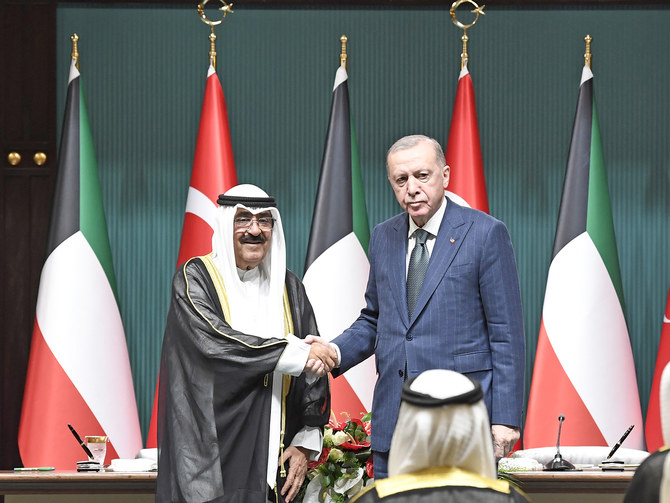
- Several cooperation deals inked at the Presidential Palace in Ankara
LONDON: Kuwait’s Emir Sheikh Meshal Al-Ahmed Al-Jaber Al-Sabah held talks on Tuesday with Turkish President Recep Tayyip Erdogan on a range of regional and international issues during his official visit to Ankara.
The two parties “expressed a common desire to bolster cooperation and coordination in many fields,” in particular trade and investment, and the emir said the two countries had the potential to boost trade exchange and investment opportunities, the Kuwait News Agency reported.
He went on to praise the “historic relations between our countries for the past 60 years, since their establishment in 1964,” and added “we express our aspirations toward promoting these relations to honor the aspirations of our peoples.”
Sheikh Meshal, who had arrived in the Turkish capital earlier on Tuesday, also praised Turkiye’s “honorable” support for Kuwait during Iraq’s invasion in 1990.
The Kuwaiti emir welcomed the start of negotiations for a free trade agreement between the GCC (Gulf Cooperation Council) and Turkiye, which commenced following the signing of a joint statement on April 21.
He added: “We affirm our aspiration for strengthening joint cooperation in all fields, especially in the defense domain through government-to-government contracting.”
The two leaders witnessed the signing of several cooperation agreements at the Presidential Palace in Ankara, including an executive protocol between the Kuwaiti and Turkish defense ministries.
The countries’ foreign ministries signed a memorandum of understanding to establish a strategic dialogue, while the Kuwaiti Civil Defense and the Turkish Ministry of Interior Disaster and Emergency Management Authority also signed a memorandum.
Letters of intent were signed between the Kuwait Direct Investment Promotion Authority and the Turkish General Authority for Free Zones in the Ministry of Trade on cooperation in the free zones field, and between the Kuwaiti Ministry of State for Housing Affairs and the Turkish Ministry of Environment, Urbanization and Climate Change on cooperation in housing and infrastructure.
The Kuwait Investment Authority and the Turkish Presidency Investment Office signed a memorandum regarding cooperation on investment promotion.
Erdogan awarded Sheikh Meshal with the State Order “to reflect deep-rooted ties between the two friendly countries,” KUNA said.
The emir also paid a visit to the Ataturk Mausoleum in Ankara during the visit.
Jordan’s Queen Rania highlights effects of war in Gaza on the world

- She tells Milken Institute Global Conference 2024 in Los Angeles the conflict has ‘divided people along new battle lines’ and fueled a growing sense polarization among peoples
- ‘The only way we can achieve security in our part of the world is through a negotiated peace, where Palestinians have not a promise of statehood, but actual statehood,’ she says
LONDON: Jordan’s Queen Rania on Tuesday discussed the global effects of Israel’s war on Gaza and called for a just solution to the wider Israeli-Palestinian conflict.
Speaking during a session at the Milken Institute Global Conference 2024 in Los Angeles on Monday, she said the war has “exposed old fractures” and “divided people along new battle lines,” which has contributed to a growing global polarization.
“Polarization leads to binary thinking; it makes us think of our world as us versus them, left versus right, East versus West,” she added. “And even though that might give us a false sense of security that we belong in a certain camp, it actually inadvertently really puts constraints on us because it kind of limits the way we think, what we should do, what we should say and, more importantly, it makes us look at everybody outside our camp as the rival, as the enemy.
“Peace cannot be achieved through violence … it has to be achieved through negotiations, political process, evenhandedness and commitment (and) the only way that we can achieve security in our part of the world is through a negotiated peace, where Palestinians have not a promise of statehood, but actual statehood.
“It all comes back down to an illegal occupation. You want safety and security, we need to end the occupation, because you cannot have a safe and secure Israel while there is a grave injustice on their border.”
Queen Rania highlighted the divisions and sense of “selective empathy” that exist in relation to the Israeli-Palestinian conflict and said people increasingly feel forced to choose sides, causing the “middle ground to shrink year after year.”
She told delegates: “When it comes to the Palestinians, I think they’ve been pushed to the periphery, where their suffering has become almost unnoticed, and where they become almost a people unto whom anything can happen without consequence.
“That’s why it’s important for us to actually find that middle ground. People should put people first. What Palestinians want is not sympathy or special treatment; they just want the impartial application of the law.”
Queen Rania also spoke about the number of civilian deaths during the war in Gaza, which began after the Oct. 7 attacks by Hamas on Israel, and noted that it has claimed the lives of more doctors, aid workers and journalists than any other conflict, as well as 14,500 children.
Regardless of whether Israel’s actions during the conflict can officially be categorized as genocide or not, many people are dying and the very fact that people are even discussing whether such a designation is justified was “shocking” enough in itself, she said.
The world expressed its collective anger over the Hamas attacks on Israel on Oct. 7, she added, so why, she asked, do the mass deaths in Gaza not warrant the same response?
“You have to give human life equal value and you have to place equal condemnation on human rights violations,” said the queen. “You cannot have credibility without moral consistency.”
The US has a very important role to play in the war because it is the single most powerful country in terms of its leverage on Israel, she said, and so much depends on how willing Washington is to use its “political capital” to hold Israeli authorities accountable for their actions.
“The starting point needs to be a legal framework that is recognized by the international community, and then a commitment from the US to hold Israel accountable when it doesn’t stick to the terms, of course,” said Queen Rania.
She added that there is a need for Israelis and Palestinians to “start to heal the wounds and to try to build the trust that has been lost now as a result of years of suffering, and we have a responsibility to try to stand behind a vision that delivers the people there the security and the future they deserve.”
The theme for the 27th annual Milken Institute Global Conference, which began on Sunday and concludes on Wednesday, is “Shaping a Shared Future.” Specific topics of discussion on the agenda include geopolitical hot spots, the climate crisis, and the rise of artificial intelligence.
UN atomic chief urges Iran to take ‘concrete’ steps for cooperation
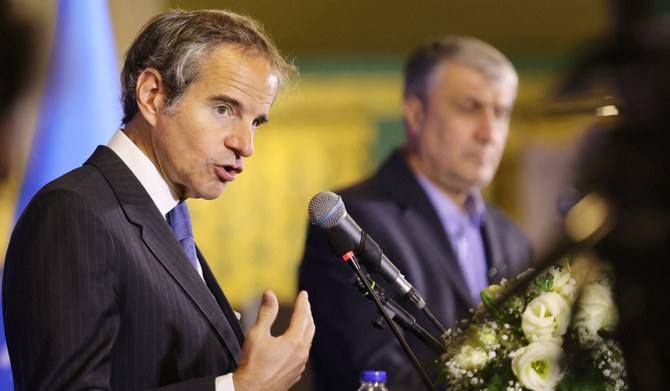
- Grossi said a March 2023 deal with Iran was “still valid” but required more “substance”
ISFAHAN: UN atomic watchdog chief Rafael Grossi, visiting Iran on Tuesday, urged the country to adopt “concrete” measures to bolster cooperation on its nuclear program and address the international community’s concerns.
At a news conference in the city of Isfahan, Grossi said he had proposed in talks with Iranian officials that they “focus on the very concrete, very practical and tangible measures that can be implemented in order to accelerate” cooperation.
The International Atomic Energy Agency director-general held talks with senior Iranian officials including Atomic Energy Organization’s head Mohammad Eslami.
Grossi insisted on the need to “settle differences” on the nuclear issue while the Middle East was going through “difficult times,” particularly with the war between Israel and the Iran-backed Palestinian militant group Hamas in the Gaza Strip.
“Sometimes, political conditions pose obstacles to full-fledged cooperation” between Iran and the international community, he said.
To overcome these obstacles, he said, “we need to come up with concrete steps that are going to be helpful in bringing us closer to these solutions that we all need.”
Grossi said a March 2023 deal with Iran was “still valid” but required more “substance.”
The agreement was reached during Grossi’s last visit to Iran and outlined basic cooperation measures including on safeguards and monitoring. The IAEA chief said, however, that there had been a “slowdown” in the agreement’s implementation including the number of inspections being reduced and the accreditation of a group of IAEA experts being withdrawn by Iran.
Iran suspended its compliance with caps on nuclear activities set by a landmark 2015 deal with major powers a year after the US in 2018 unilaterally withdrew from the agreement and reimposed sweeping sanctions.
“We have this legal right to reduce our commitments when the other parties do not adhere to their obligations,” Eslami said during the joint news conference.
Tensions between Iran and the IAEA have repeatedly flared since the deal fell apart, and EU-mediated efforts have so far failed both to bring Washington back on board and to get Tehran to again comply with the terms of the accord.
The agency has in recent months criticized Iran for a lack of cooperation on issues including the expansion of its nuclear work, the barring of inspectors and deactivating the agency’s monitoring devices at its nuclear facilities.


